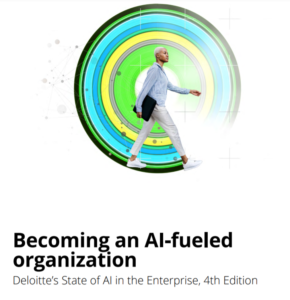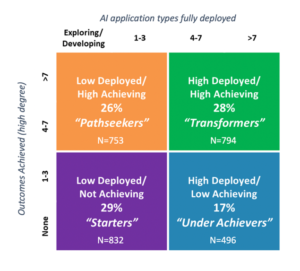
Hallmarks of AI Success in the Enterprise

(metamorworks/Shutterstock)
We’re in the midst of a rapid uptake of AI in the enterprise across the board, but there are big differences in the results and the workflows in these AI practices. For its latest “State of AI in the Enterprise” report, Deloitte looked for the commonalities that mark successful AI practices, as well as the practices associated with lower achievement.
For its fourth annual AI report, titled “Becoming an AI-fueled organization,” Deloitte surveyed 2,875 executives from 11 countries in the Americas, EMEA, and APAC to determine how they’re using AI, what kinds of results they’re getting, and their underlying practices.
Deloitte grouped the companies into four main groups, based on the volume of AI projects and their success rate. Transformers, which accounted for 28% of survey respondents, were characterized by high outcomes and a high number of AI deployments, while Pathseekers, which accounted for 26% of respondents, reporting high outcomes, but a low number of deployments.
Underachievers, which represented 17% of respondents, reported low outcomes and a high number of deployments, while Starters, the biggest group accounting for 29% of survey respondents, reported low outcomes and a low number of deployments.
Several characteristics stood out among the Transformers and the Pathseekers, according to Deloitte’s survey.
For starters, representatives from these two groups are more likely to say that AI differentiates their organization from competitors. They are also more likely to have an enterprise-wide AI strategy, as well as senior leadership who communicate a transformative AI vision. Lastly, Transformers and Pathseekers are more likely to lean on AI initiatives to remain competitive in five years, although the separation on that question was not great.
While these high-achieving companies are definitely focused on using AI for a competitive advantage, there’s a counter-intuitive principle at work among the most successful enterprises: True differentiation comes from business outcomes, not AI tech.
“The strongest AI strategies start without ever mentioning AI,” Deloitte says in its report. “Instead, they should begin with the organization’s north star: the core business strategy… Ultimately, AI strategy should function as the fuel to the business strategy, aligning to the same KPIs that have been crafted to incentivize and grow competitive advantage.”
Lower achievers tend to ask data scientists or the IT department to drive their AI strategy. That is not ideal, says Deloitte. Rather, the AI strategy should flow from the business, and it should encompass the entire enterprise, if possible. Deloitte cited the example of Jeff Bezos, who in 2010 mandated that every leader at Amazon.com come up with a strategy for how they’re going to use AI and machine learning. This drove unparalleled growth, Deloitte says, and was a catalyst for the company’s amazing growth.
There’s another interesting commonality among Transformers and Pathseekers: they tend to enact more growth-oriented AI projects, while the Underachievers and Starters tend to focus more on cost-cutting AI projects. In fact, both types of AI projects are typically needed, according to Deloitte, which also questioned the efficacy of embarking upon just a handful of AI projects. In Deloitte’s view, the more AI projects, the merrier.
Succeeding at AI is not a one-off project, but rather a continuous process says Nitin Mittal, Deloitte AI co-leader, and principal, Deloitte Consulting. “Becoming an AI-fueled organization is to understand that the transformation process is never complete, but rather a journey of continuous learning and improvement,” he says.
“You have to pick the right questions, and have a what I call a diversified portfolio of questions to drive impact, ensuring that you can demonstrate early value to build momentum for achieving longer-term, sustainable impact.” — Najat Khan, Ph.D., Chief Data Science Officer and Global Head of Strategy & Operations for Janssen Research & Development.
Deloitte also looked into the workflow habits of high-achieving AI groups and found that a dedication to MLOps processes are correlative to success.
“Organizations that document and enforce MLOps processes are twice as likely to achieve their goals to a high degree,” the company stated in its report. “They are also four times more likely to report being extremely prepared for risks associated with AI, and three times more confident that they can deploy AI initiatives in a trustworthy way.”

You can download Deloitte’s latest “State of AI in the Enterprise”report here
Deloitte identified trust, data fluency, and agility as additional characteristic that differentiate between high- and low-achieving AI groups. Organizations that invest in change management to manage their AI implementations are 60% more likely to report that AI initiatives exceed expectations and 40% more likely to achieve outcomes than those that don’t, Deloitte says.
Interestingly, fear is another factor that shows up in high-achieving AI groups. It’s not fear of AI replacing jobs, however, the company says. “[F]ear may be a positive indicator that an organization’s AI vision is bold,” it says.
Another characteristic of high-achieving AI groups is a reliance on a broad ecosystem of partners and tool providers. Deloitte’s survey found that 83% of the Transformers and Pathfinders “create a diverse ecosystem of partnerships to execute their AI strategy.” An overreliance on a smaller number of partners and tool vendors also puts a company at risk of vendor lock-in, Deloitte says.
The risks associated with AI remain top of mind for executives, says Beena Ammanath, executive director of the Deloitte AI Institute. But that shouldn’t keep them from moving forward.
“We found that high-achieving organizations report being more prepared to manage risks associated with AI and confident that they can deploy AI initiatives in a trustworthy way,” she says.
Related Items:
It’s Time to Implement Fair and Ethical AI
As AI Matures, So Too Do Risks, Survey Finds
Corporate Culture Continues to Stymie Data Insights































